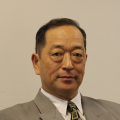Kozo Hiramatsu
Kozo Hiramatsu is Director of the London Office of the Japan Society for the Promotion of Science. He is Professor Emeritus of Kyoto University and was British Council Fellow at Southampton University, 1981-82. His academic research has been on the sonic environment, initially the engineering of noise control and subsequently in the field study of acoustic ecology.

When I went to Southampton in October 1981 as a British Council Fellow, I had not expected that the one-year visit would prove so crucial to my future academic career. I was an Assistant Professor in the Environmental Engineering Department of Kyoto University, doing research mainly on the effect of noise. The Institute of Sound and Vibration Research of Southampton University was a fabulous institution with a high reputation worldwide. What I really envied was the way the academic staff could focus their energy mostly on research and education thanks to the assistance of many support staff. Besides conducting psychophysics experiments in whole body vibration and regularly going to real ale pubs as a CAMRA member, I frequently visited libraries and encountered a book written by a late prominent Harvard professor of acoustical engineering. It was almost the first book published about the history of acoustics before the emergence of modern science. I was so impressed by the book that I decided to translate it into Japanese and it was later published in Japan. The libraries in the UK were amazingly useful for me in finding the references cited in the book, many of which were classical and even medieval texts dealing with Greek, Roman and Arabic science and civilisation. In doing so, I found I was reading many books on the history and philosophy of science as a matter of course. That experience was epoch-making and later led me to reconsider the paradigm of my own research in engineering and to get out of the laboratory into the town of Kyoto to do fieldwork on the sonic environment. As field studies were not regarded as ‘engineering’, I left the Engineering Department and eventually became a professor of area studies. Would this have happened if I had not left Japan? Not impossible perhaps, but it would have been extremely difficult. Or rather, I should say that had I stayed in Japan, pursued by the miscellaneous demands of day-to-day university business, it would have been unlikely. Without the terrific libraries and the friendly colleagues who answered my questions, I have no doubt I could not have translated the book and discovered those texts on the history and philosophy of science. Putting myself in the British environment was a truly fruitful experience. And I cannot find proper words with which to express my gratitude to the British Council.
Find out more about the Japan Society for the Promotion of Science here
